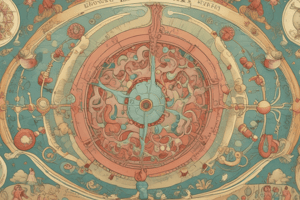Podcast
Questions and Answers
What can excessive levels of progesterone cause during pregnancy?
What can excessive levels of progesterone cause during pregnancy?
- Increases memory retention
- Enhances secondary sexual characteristics
- Causes premature birth
- Hinders contraction of the uterus during birth (correct)
What is a consequence of testosterone deficiency after puberty?
What is a consequence of testosterone deficiency after puberty?
- Inability to have an erection or orgasm (correct)
- Early onset of secondary sexual characteristics
- Increased muscle mass
- Enhanced libido
What can result from growth hormone deficiency in children?
What can result from growth hormone deficiency in children?
- Dwarfism (correct)
- Increased bone density
- Gigantism
- Acromegaly
Which of the following is NOT a factor that should be kept constant for homeostasis?
Which of the following is NOT a factor that should be kept constant for homeostasis?
What type of feedback mechanism is responsible for regulating body temperature?
What type of feedback mechanism is responsible for regulating body temperature?
Which condition can result from excessive growth hormone in adults?
Which condition can result from excessive growth hormone in adults?
What does homeostasis primarily maintain within the body?
What does homeostasis primarily maintain within the body?
Which hormone is primarily responsible for regulating the development of secondary sexual characteristics in males?
Which hormone is primarily responsible for regulating the development of secondary sexual characteristics in males?
What is the primary function of the endocrine system?
What is the primary function of the endocrine system?
Which of the following is a key difference between the endocrine and nervous systems?
Which of the following is a key difference between the endocrine and nervous systems?
What type of gland is responsible for secreting hormones directly into the bloodstream?
What type of gland is responsible for secreting hormones directly into the bloodstream?
How do hormones achieve their effects in the body?
How do hormones achieve their effects in the body?
What is the nature of enzymes compared to hormones?
What is the nature of enzymes compared to hormones?
What does up regulation of hormone receptors mean?
What does up regulation of hormone receptors mean?
What is a primary characteristic of exocrine glands?
What is a primary characteristic of exocrine glands?
What is the primary role of steroids in the endocrine system?
What is the primary role of steroids in the endocrine system?
What are steroid hormones primarily made of?
What are steroid hormones primarily made of?
Which statement about non-steroid hormones is correct?
Which statement about non-steroid hormones is correct?
Which endocrine gland is referred to as the 'master gland'?
Which endocrine gland is referred to as the 'master gland'?
What type of hormones do the ovaries produce?
What type of hormones do the ovaries produce?
What does follicle stimulating hormone (FSH) stimulate?
What does follicle stimulating hormone (FSH) stimulate?
Which characteristic is true for all endocrine glands?
Which characteristic is true for all endocrine glands?
What is the primary role of thyroxine?
What is the primary role of thyroxine?
Where is the hypothalamus located?
Where is the hypothalamus located?
Which hormone is produced by the anterior lobe of the pituitary gland?
Which hormone is produced by the anterior lobe of the pituitary gland?
What condition can result from excessive levels of parathyroid hormone?
What condition can result from excessive levels of parathyroid hormone?
Which gland produces antidiuretic hormone (ADH)?
Which gland produces antidiuretic hormone (ADH)?
What role does the gonadotropin-releasing hormone (GnRH) play?
What role does the gonadotropin-releasing hormone (GnRH) play?
What is a potential effect of thyroxine deficiency in adults?
What is a potential effect of thyroxine deficiency in adults?
Which hormone is responsible for causing ovulation in females?
Which hormone is responsible for causing ovulation in females?
Where is the thyroid gland located?
Where is the thyroid gland located?
What hormone stimulates milk production in the mammary glands?
What hormone stimulates milk production in the mammary glands?
What is the primary function of the adrenaline hormone?
What is the primary function of the adrenaline hormone?
What hormone is produced by beta cells in the pancreas?
What hormone is produced by beta cells in the pancreas?
What condition may occur due to excessive cortisol hormone?
What condition may occur due to excessive cortisol hormone?
Which hormone regulates blood osmotic pressure?
Which hormone regulates blood osmotic pressure?
What happens when there is a deficiency of insulin?
What happens when there is a deficiency of insulin?
What is the role of testosterone in males?
What is the role of testosterone in males?
What effect can excessive levels of aldosterone cause?
What effect can excessive levels of aldosterone cause?
What is an effect of excessive androgen hormone levels?
What is an effect of excessive androgen hormone levels?
What is the primary role of glucagon?
What is the primary role of glucagon?
What might a deficiency of estrogen lead to?
What might a deficiency of estrogen lead to?
Flashcards
Endocrine System
Endocrine System
A system of glands that releases hormones, controlling growth, development and reproduction.
Hormones
Hormones
Chemical messengers produced by glands and transported through the bloodstream.
Exocrine Glands
Exocrine Glands
Glands that release substances into ducts, such as salivary glands and sweat glands.
Endocrine Glands
Endocrine Glands
Signup and view all the flashcards
Up-regulation
Up-regulation
Signup and view all the flashcards
Down-regulation
Down-regulation
Signup and view all the flashcards
Steroids
Steroids
Signup and view all the flashcards
Enzymes
Enzymes
Signup and view all the flashcards
What are steroid hormones?
What are steroid hormones?
Signup and view all the flashcards
What are non-steroid hormones?
What are non-steroid hormones?
Signup and view all the flashcards
What are the defining features of endocrine glands?
What are the defining features of endocrine glands?
Signup and view all the flashcards
What makes hormones highly specific?
What makes hormones highly specific?
Signup and view all the flashcards
What is the pituitary gland?
What is the pituitary gland?
Signup and view all the flashcards
What does the Anterior Pituitary Lobe do?
What does the Anterior Pituitary Lobe do?
Signup and view all the flashcards
What does the Posterior Pituitary lobe do?
What does the Posterior Pituitary lobe do?
Signup and view all the flashcards
What is the role of the hypothalamus?
What is the role of the hypothalamus?
Signup and view all the flashcards
What is the function of adrenaline?
What is the function of adrenaline?
Signup and view all the flashcards
What is Cushing's syndrome?
What is Cushing's syndrome?
Signup and view all the flashcards
What is cortisol?
What is cortisol?
Signup and view all the flashcards
What is Addison's disease?
What is Addison's disease?
Signup and view all the flashcards
What is aldosterone?
What is aldosterone?
Signup and view all the flashcards
What is testosterone?
What is testosterone?
Signup and view all the flashcards
What is insulin?
What is insulin?
Signup and view all the flashcards
What is glucagon?
What is glucagon?
Signup and view all the flashcards
What is estrogen?
What is estrogen?
Signup and view all the flashcards
What are beta cells?
What are beta cells?
Signup and view all the flashcards
What does progesterone do?
What does progesterone do?
Signup and view all the flashcards
What happens when there is too much progesterone?
What happens when there is too much progesterone?
Signup and view all the flashcards
What is testosterone's main function?
What is testosterone's main function?
Signup and view all the flashcards
What happens if there is not enough testosterone before puberty?
What happens if there is not enough testosterone before puberty?
Signup and view all the flashcards
What happens if there is not enough testosterone after puberty?
What happens if there is not enough testosterone after puberty?
Signup and view all the flashcards
How is hormone secretion controlled?
How is hormone secretion controlled?
Signup and view all the flashcards
What happens with growth hormone deficiency and excess?
What happens with growth hormone deficiency and excess?
Signup and view all the flashcards
What is homeostasis?
What is homeostasis?
Signup and view all the flashcards
What does Follicle Stimulating Hormone (FSH) do?
What does Follicle Stimulating Hormone (FSH) do?
Signup and view all the flashcards
What does Luteinizing Hormone (LH) do?
What does Luteinizing Hormone (LH) do?
Signup and view all the flashcards
What is Growth Hormone (GH) and what does it do?
What is Growth Hormone (GH) and what does it do?
Signup and view all the flashcards
What is Prolactin (PRL) and what does it do?
What is Prolactin (PRL) and what does it do?
Signup and view all the flashcards
What is Thyroxine and what does it contain?
What is Thyroxine and what does it contain?
Signup and view all the flashcards
What are the functions of Thyroxine?
What are the functions of Thyroxine?
Signup and view all the flashcards
What is Parathyroid hormone and what does it do?
What is Parathyroid hormone and what does it do?
Signup and view all the flashcards
What are Adrenal glands and what do they do?
What are Adrenal glands and what do they do?
Signup and view all the flashcards
Study Notes
Endocrine System Summary
- The endocrine system is a collection of glands that produce hormones, regulating growth, development, and reproduction.
- Two key words defining the system are: "endo" meaning within and "crinis" meaning to secrete
Endocrine vs Nervous System
- Both systems involve chemical transmission of messages for communication and survival responses.
- The endocrine system has long-term effects, while the nervous system has short-term effects.
- Responses in the endocrine system are involuntary, whereas nervous system responses can be voluntary or involuntary.
Glands
- Glands are organs that release substances with specific functions.
- Exocrine glands have ducts and secrete enzymes (e.g., salivary, sweat, pancreas, liver).
- Endocrine glands are ductless and secrete hormones (e.g., many internal glands).
Hormones vs Enzymes
- Hormones are organic compounds (proteins or steroids) that regulate processes.
- Enzymes are proteins that speed up metabolic reactions.
Hormone Action
- Hormones are released into the bloodstream and travel to target cells.
- Up-regulation increases receptor numbers, and down-regulation decreases them.
- Steroid hormones (e.g., androgens, cortisol, estrogen, progesterone) are lipid-soluble and pass through cell membranes.
- Non-steroid hormones (e.g., insulin, thyroid hormones) are not lipid-soluble and bind to cell membrane receptors.
Pituitary Gland (Anterior Lobe)
- Releases hormones that regulate other endocrine glands and body functions.
- Thyroid-stimulating hormone (TSH) stimulates the thyroid.
- Adrenocorticotropic hormone (ACTH) regulates the adrenal cortex.
Pituitary Gland (Posterior Lobe)
- Releases hormones that directly affect body functions.
- Oxytocin stimulates uterine contractions.
- Antidiuretic hormone (ADH) regulates water reabsorption in the kidneys.
Thyroid Gland
- Located in the neck, producing the hormone thyroxine.
Adrenal Glands
- Located above the kidneys, made of two parts:
- Adrenal medulla releases adrenaline and noradrenaline during stress.
- Adrenal cortex produces cortisol and aldosterone, managing metabolic processes and blood pressure..
Pancreas
- Located behind the stomach, consists of Islets of Langerhans with beta cells (insulin) and alpha cells (glucagon) that control blood sugar levels.
Gonads (Ovaries & Testes)
- Produce sex hormones:
- Ovaries produce estrogen and progesterone (female).
- Testes produce testosterone (male).
Hormonal Regulation
- Homeostasis is the body's maintenance of a stable internal environment.
- Feedback mechanisms (negative and positive) regulate hormone secretion.
- Factors like glucose, temperature, and pH are kept relatively constant.
- Hormonal imbalances can lead to various disorders.
Body Temperature Regulation
- Poikilotherms have varying body temperatures, while homeotherms maintain a stable temperature.
- Factors affecting temperature regulation include body surface area, insulation, environmental conditions, and heat exchange mechanisms (conduction, convection, radiation, evaporation).
Studying That Suits You
Use AI to generate personalized quizzes and flashcards to suit your learning preferences.




